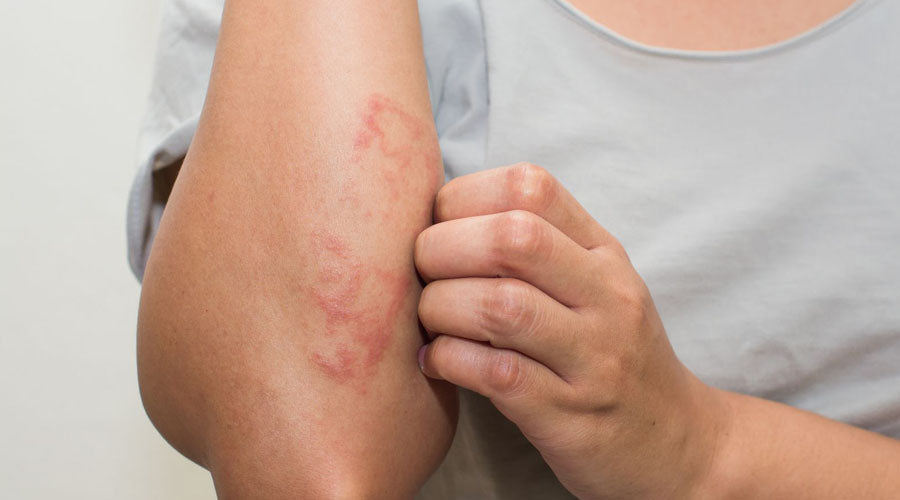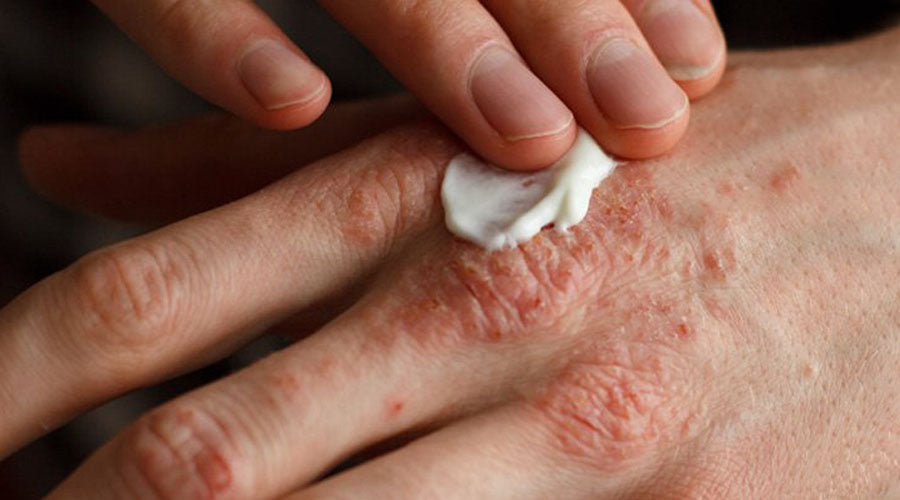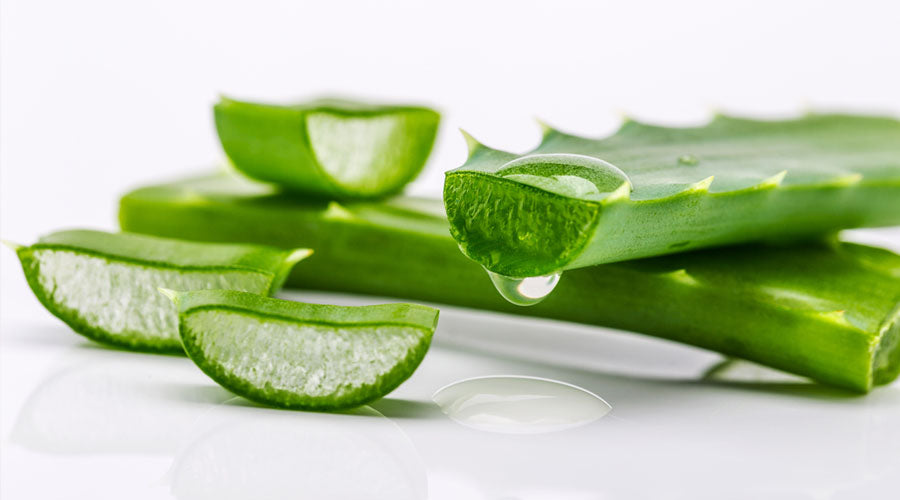Is your eczema cream making your eczema worse
|
|
Time to read 8 min
|
|
Time to read 8 min
If you suffer from eczema cream, I don’t have to tell you how severe the inflammation can be, how strong the urge to scratch is or how the redness is downright discouraging at times. This frustrating list of symptoms sends 1 out of 10 Americans scrambling to the doctor in search of prescription this creams to bring relief.
Today I want to pose the question, “Is your eczema cream really all it’s cracked up to be?” I know that might sound a little shocking, but hear me out. There will always be another “breakthrough” over-the-counter to hit the market. If you’re not careful, you can fall prey to shiny object syndrome, chasing after every new thing that promises results. The thing you have to remember is that there are a few foundational goals when treating eczema that should guide your treatment options and buying decisions.
Truly managing the eczema cream involves tackling the root cause of the condition without limiting yourself to just the temporary alleviation of symptoms. Every prescription eczema cream you come across or otherwise should be compared to these goals to determine its true value of eczema cream. Let’s take a look at what those goals are, then see if traditional measure up.
Many skincare products have labels that read “pH balanced,” yet many consumers don’t really know what that means. The logic behind these formulations is that a change in skin pH usually leads to skin distress. Our skin is the primary barrier against any external infections or environmental stress. This protective ability is dependent in large part on a proper pH level. The protective layer of your skin is known as the acid mantle and is made up of sebum, which mixes with amino acids and lactic acid in sweat to form the slightly acidic pH of skin.
Many skincare products interfere with the skin’s pH by disturbing the normal balance of the acid mantle. When used continuously, some skin oils even predispose you to conditions such as eczema. It’s important to note that some products claim to be pH balanced just for marketing purposes. If you are unsure whether a product is pH balanced, you can use a home pH testing kit, which is available in most stores.
Since eczema is largely an inflammatory process, creating an anti-inflammatory environment within your body is essential. One simple way to do this is by consuming anti-inflammatory foods. Nutrients such as omega-3 fatty acids, usually obtained from fish or fish oil, are potent anti-inflammatory agents.
On the flip side, you want to avoid inflammatory foods such as gluten, grains, sugar, hydrogenated oils, dairy and more. It’s also important to address the histamine issues that are often the cause of itchy skin. Pruritis (or chronic itchy skin) is usually precipitated by the excess production of histamine. So it makes sense that antihistamines could counteract such symptoms.
One of the best natural antihistamines is quercetin. Besides being a potent antihistamine, quercetin is also a powerful antioxidant and anti-inflammatory agent, which helps explain its mechanism of action and benefits for conditions like eczema. Foods rich in quercetin include apples, spinach, kale, broccoli and cherries.
What happens in your gut not only has a direct impact on your immune system but also your skin as shown in this 2016 study and this study published in the Australasian Journal of Dermatology. The gut-skin connection is best understood by looking at leaky gut and its effects. The gastrointestinal tract is supposed to be a barrier that prevents undigested food, toxins, microbes and other substances from entering the bloodstream.
When the cells of the gut wall are damaged, these substances leak into the body and are attacked by the immune system in the form of inflammation. This inflammatory response can manifest in any part of the body. When it occurs in the skin, it often leads to eczema. Understanding this connection, it makes sense that if you reverse leaky gut, you’ll eliminate (or at least drastically reduce) the inflammatory response associated with conditions like eczema.
The damaged skin barrier associated with it also makes it more difficult to retain water, so proper eczema cream is key. But you don’t want to just slap anything on your skin, even if it’s labeled a moisturizer. It is important to read labels carefully, sticking to skin-nourishing ingredients and avoiding harsh chemicals.
Unfortunately, many moisturizers and eczema cream contain ingredients that negatively alter the pH of your skin. These include chemicals, parabens, triethanolamine (TEA) and others. A few great options to moisturize naturally include colloidal oatmeal, coconut oil and aloe vera.
Now we’ve come to the part of this post where we determine if your current prescription or over-the-counter eczema cream measures up. Thinking about what the ultimate goals are for healing eczema, do these creams do their job? Our opinion? No. They only address the rash without addressing why the rash is happening in the first place. The downfalls of over-the-counter of eczema cream aren’t just limited to their inability to address the real issue, however.
The primary reason they are problematic is due to their ingredients list. Hydrocortisone, for instance, is the most widely recommended treatment for eczema with eczema cream. It is a steroid that works by reducing topical inflammation and its related symptoms - redness, swelling and itchiness. To understand the potential effects of topical steroids, it’s important to realize that skin cells are NOT impermeable.
In fact, for those who suffer with eczema, their skin barrier is even more permeable, readily absorbing any chemicals, bacteria and yes, steroids, that it comes in contact with. Continuous use of topical steroids can damage the natural acid mantle of your skin even further, allowing more and more pathogens to leak in. Regular use of hydrocortisone eczema creams can also make the skin resistant to the steroids, requiring a larger and larger dose to be effective.
Not only that, many people experience a “rebound effect” when they stop these common this eczema creams, resulting in a fast and furious return of symptoms. And that’s just with regular use of the 1% hydrocortisone creams. The majority of prescription this contain much higher amounts of steroids. Ultimately, what do you get in exchange for a laundry list of potential side effects? Just temporary relief - not healing.
Besides that, some research like this 2011 study published in the British Journal of Dermatology has shown that popular lotion can be downright destructive. The study looked at Aqueous cream BP, a common eczema cream recommended for eczema patients. Their research showed that eczema cream actually reduced the thickness of the skin’s protective layer - sometimes patients already struggle with. In large part, traditional prescription eczema cream, as well as over-the-counter ones, do nothing to restore the skin barrier and can actually degrade it even further.
When you consider the ultimate goals in healing eczema cream, topical treatments using natural ingredients are the clear winners. They have minimal to no side effects and can be used over and over again without fear of developing resistance or further damaging the skin’s delicate, protective barrier eczema cream. As long as you do your research and find the right one, natural eczema cream also do not contain additives, chemicals or pH disruptors. Not only do natural ingredients not damage the skin, but they actually nourish it with their intrinsic anti-inflammatory properties as well as their moisturizing abilities, antioxidant effects and more.
Here is a list of some of the best natural ingredients for eczema cream:
Honey in itself has been used for centuries to treat a variety of conditions. Besides protecting against bacteria, honey also stimulates the production of immune cells that repair damaged tissues. Manuka honey in particular contains hydrogen peroxide, which is a potent antibacterial agent and methylglyoxal, which also has antibacterial effects.
The aloe vera plant produces a juice that is loved for its anti-inflammatory and antibacterial properties. It is also naturally loaded with nourishing nutrients such as vitamins A and E as well as various minerals.
Coconut oil contains antibacterial, antifungal, antimicrobial and antioxidant properties. This makes it effective in the all-round management of eczema cram. It also soothes the skin and reduces itchiness during flares while preventing inflammation.
MSM can be called the “Beauty Mineral” thanks to its amazing ability to boost collagen and keratin product. This increases overall skin health, promotes skin regeneration, softens dry/cracked skin, and reduces pain, and inflammation.
Thanks to an abundance of fatty acids, hemp seed oil increases blood flow which leads to faster healing. It has shown to soften skin, reduce inflammation, improve elasticity and reduce redness. It works wonders on dry, cracked skin common with eczema.
We combined all these ingredients and more into our Relief Eczema Moisturizer Cream. It will provide you relief of your eczema symptoms while simultaneously tackling its root causes. All while being pH balanced and free from harmful chemicals. Want proof that plant-based ingredients are stronger than steroid creams? Take a look at the results Claire got from using Relief:
She had lived with eczema cream for 8 years so severe it was on the level of 3rd degree burns. After wasting $25,000 on doctors, steroids, prescriptions, and more she found our eczema cream. In just one week her skin changed dramatically, and soon she was complete eczema free! Learn more about her story here.
When you think of eczema treatment with eczema cream as a whole, it’s important to always keep the bigger picture in mind. Of course you want relief from those frustrating symptoms, but you don’t necessarily want it at the expense of introducing detrimental ingredients to your skin’s already damaged barrier. Food-grade ingredients like coconut oil and manuka honey, along with skincare products that utilize these in the best way possible, provide a much safer solution that tackles symptoms while addressing eczema’s root cause. Be sure to apply skin-nourishing ingredients, eat a low inflammatory diet, heal your gut and moisturize appropriately. If you do these things, you’ll find your flare-ups will become few and far between.
The best treatment for eczema includes using moisturizing creams, applying topical steroids or other prescribed medications, and avoiding triggers such as harsh soaps and allergens.
The fastest way to heal eczema is to use a thick, emollient moisturizer frequently, apply topical corticosteroids as prescribed, and avoid irritants and allergens.
To stop eczema, use moisturizers regularly, apply prescribed treatments, avoid irritants and allergens, and manage stress.
Eczema starts due to a combination of genetic factors, immune system dysfunction, and environmental triggers like irritants, allergens, and stress.


